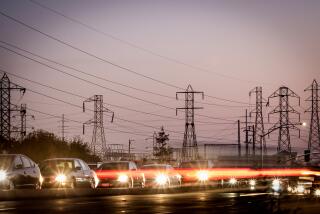8 States Want Stiffer Safeguards to Thwart Nuclear Plant Attacks
- Share via
The attorneys general from eight states, including Bill Lockyer of California, are urging federal regulators to bolster security at the nation’s nuclear power plants, including protections against the type of attack that destroyed the World Trade Center on Sept. 11.
In recent letters to the Nuclear Regulatory Commission, the attorneys general say current defenses are outdated and may not stand up against heavily armed terrorists attacking by air, land or water in significant numbers.
“The standard defining the threat against which owners must protect nuclear power plants remains essentially what it was in the 1970s -- a land attack by no more than four men,” states one letter signed by seven of the eight officials. “The NRC should upgrade the threat to reflect the realities of 2005.”
In the Sept. 11 attacks, 19 terrorists hijacked four jetliners. Two were rammed into the twin towers of the World Trade Center, destroying them. One smashed into the Pentagon, and the fourth crashed in a western Pennsylvania field.
The nation has 103 commercial nuclear reactors, including four that operate at San Onofre in northern San Diego County and Diablo Canyon near San Luis Obispo.
Urging the NRC to make security upgrades are state attorneys general Lockyer, Eliot Spitzer of New York, Lisa Madigan of Illinois, Richard Blumenthal of Connecticut, Terry Goddard of Arizona, Peg Lautenschlager of Wisconsin, Mike Beebe of Arkansas and Jane Brady of Delaware. Seven of the officials sent their letter Monday. Brady sent a separate letter Jan. 21.
About a third of the nation’s commercial nuclear reactors are in those officials’ states and close to major population centers.
“We have San Onofre and Diablo Canyon on our coasts,” said Tom Dresslar, a spokesman for Lockyer. “This makes the state’s interest clear in ensuring that these facilities are adequately protected against every kind of terrorist threat.”
The letters were sent in support of a formal petition submitted to the NRC in July by the Committee to Bridge the Gap, a 25-year-old organization that has pushed repeatedly for safety precautions at nuclear power plants.
“The states are very concerned about the federal failure to upgrade protections at some of the most dangerous facilities in our country after 9/11,” said Dan Hirsch, a co-founder of the Santa Cruz-based group.
The committee has asked the NRC to require plant operators to increase security requirements in specific ways to thwart attacks from air, land or water -- for example, installing steel barriers to deflect crashing aircraft. Hirsch said plants should be able to repel at least 19 terrorists, the size of the force involved in Sept. 11.
The NRC accepted the committee’s petition for review in November and initiated a public comment period, which ended Monday.
Eliot Brenner, an NRC spokesman, said the agency received about 700 responses to the committee’s petition for security upgrades.
In contrast to the attorneys general, the Nuclear Energy Institute, a trade organization and lobbying arm for the industry, has notified the NRC of its opposition to the committee’s request.
Institute officials say substantial improvements in plant security have been made since Sept. 11, and that the industry is confident terrorist attacks can be repelled.
They also point out that studies by the industry and the NRC indicate that crashes of large jetliners into nuclear plants are unlikely to cause significant harm to the public. Research in Germany has found otherwise, however.
Of 37 public comments posted on the NRC’s website, 35 support the request for more security at nuclear power plants, including shields against possible air attack. Two were opposed to any upgrade.
The petition eventually will go before several review boards, then on to commissioners for a decision. If adopted, the proposed new rules could take 18 to 24 months to draft.
More to Read
Sign up for Essential California
The most important California stories and recommendations in your inbox every morning.
You may occasionally receive promotional content from the Los Angeles Times.














